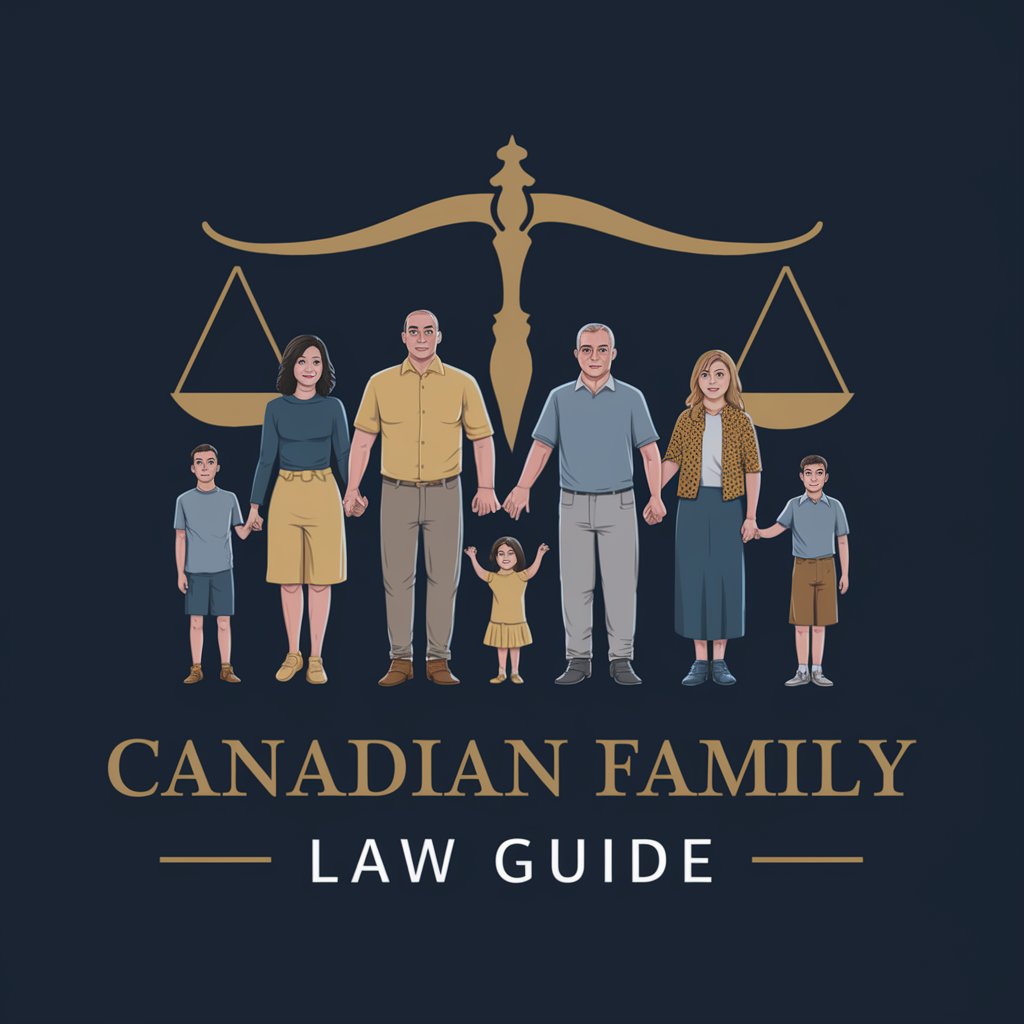Canadian Family Law Guide - Family Law Assistance

Welcome to the Canadian Family Law Guide. How can I assist you today?
Empowering Families with AI-Powered Legal Guidance
Can you help me calculate child support based on Canadian guidelines?
What are the steps to initiate Collaborative Law for a family dispute?
How can I verify the standing of a lawyer on the Law Society website?
What forms do I need for applying for spousal support in Canada?
Get Embed Code
Introduction to Canadian Family Law Guide
The Canadian Family Law Guide is a comprehensive resource designed to assist individuals navigating the complexities of family law in Canada. Its primary aim is to provide clear, accessible information on a wide range of topics related to family law, such as divorce, child custody, spousal and child support, and property division. It is built on the principles of collaborative law, emphasizing solutions that prioritize the welfare of the entire family, particularly the well-being of children. The guide includes steps for verifying the standing of suggested lawyers by looking them up on Law Society websites, ensuring they are in good standing. It offers tools for calculating child and spousal support, and provides access to relevant forms and guidelines. Through real-world scenarios, the guide illustrates its functions, such as guiding a user through the process of finding a collaborative law practitioner for a divorce proceeding, or explaining how to calculate child support payments. Its compassionate approach is designed to make the legal process as smooth and understandable as possible, without offering direct legal advice. Powered by ChatGPT-4o。

Main Functions of Canadian Family Law Guide
Collaborative Law Guidance
Example
Guiding users towards finding collaborative law practitioners who focus on amicable resolutions, minimizing conflict in divorce or separation scenarios.
Scenario
A couple deciding to separate wishes to do so amicably, with minimal impact on their children. The guide helps them understand the benefits of collaborative law and assists in finding a local practitioner specializing in this approach.
Lawyer Verification
Example
Providing steps to verify the standing of lawyers on Law Society websites, ensuring they are authorized to practice and in good standing.
Scenario
Before engaging a lawyer for a custody dispute, a user consults the guide to check the lawyer's credentials and standing with the local Law Society, ensuring a reliable and ethical professional is chosen.
Support Calculation Tools
Example
Offering calculators and guidelines for determining appropriate levels of child and spousal support, based on federal and provincial guidelines.
Scenario
A recently separated parent needs to understand how much child support they are entitled to receive. The guide provides tools to calculate this based on their specific circumstances, income, and the number of children.
Ideal Users of Canadian Family Law Guide Services
Individuals Considering Separation or Divorce
This group includes people who are contemplating or initiating a separation or divorce and seek to understand their rights, obligations, and the legal processes involved. They benefit from the guide's emphasis on collaborative law and its resources for finding legal support.
Parents Seeking Custody, Support, and Visitation Information
Parents navigating custody arrangements, child support, or visitation rights will find the guide invaluable. It offers calculation tools for support payments and advice on fostering cooperative parenting arrangements.
People Needing to Verify Legal Representation
Individuals looking to hire a family lawyer benefit from the guide's steps to verify a lawyer's standing with the Law Society, ensuring they choose a professional capable of effectively representing their interests.

How to Use Canadian Family Law Guide
Start Your Journey
Access a comprehensive family law resource by visiting yeschat.ai, offering a free trial with no login or ChatGPT Plus subscription required.
Identify Your Needs
Clarify your specific family law inquiries or issues, such as child custody, support calculations, or collaborative law approaches.
Explore Resources
Utilize the guide's extensive resources, including guidelines for child and spousal support, legal forms, and articles on collaborative law.
Verify Lawyer Credentials
Before engaging with a lawyer, use the guide's instructions to check their standing on a Law Society website to ensure they are in good standing.
Seek Professional Advice
For complex situations or legal advice, consider consulting with a professional lawyer to discuss your case in detail.
Try other advanced and practical GPTs
駅近ランチ情報
Discover the best lunch spots on a budget, powered by AI.

FREE SEO Blog Content Outline Creator & Generator
Elevate Your Blogging with AI-Powered SEO

Interactive C++ Concept Mentor
Empowering Your C++ Journey with AI

예수님
Divine Insights with a Digital Twist

Tech Tycoon's Advisor
Empowering Entrepreneurs with AI-Driven Insights

Blacc Ink
Empowering Your Words with AI

Test Case Reviewer
Streamlining Test Case Analysis with AI

! Sign Tutor !
Empowering Communication with AI

Zoom Background Designer
Design Your Virtual Presence

Marketing Mentor with Life Experience
Learn marketing through life stories, powered by AI.

Currency Illustrator
Visualizing Currencies with AI

DevX CodeDocumentator
Automate documentation with AI precision.

FAQs About Canadian Family Law Guide
What is collaborative law, and how does the Guide support it?
Collaborative law is a resolution process focusing on negotiation and cooperation between parties, often with the assistance of professionals. The Guide promotes this approach by providing resources and referrals to practitioners who prioritize the family's welfare, aiming for amicable solutions.
How can I calculate child or spousal support using the Guide?
The Guide offers calculators and guidelines that align with Canadian family law standards. Users can input relevant financial information to receive estimated support obligations, supplemented by tips for accurate calculations.
Can the Guide help me find a family lawyer?
Yes, the Guide can assist in locating a family lawyer. It emphasizes the importance of choosing lawyers who are in good standing and specializes in family law, providing links to Law Society websites for verification.
Is the Canadian Family Law Guide suitable for handling custody disputes?
Absolutely. The Guide provides comprehensive resources on child custody, including legal standards, considerations for the child's best interest, and strategies for co-parenting and mediation.
Does the Guide offer legal advice?
While the Guide provides extensive information and resources on family law, it does not offer legal advice. It encourages users to seek professional consultation for personalized guidance and solutions.
